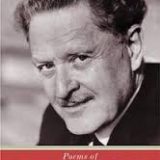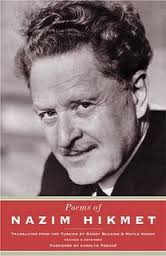Human Landscapes from My Country – Nazim Hikmet – 1966
Reviewed by: Chris King – The Washington Post Sunday, July 21, 2002; Page BW13
Exile’s Return
Reviewed by Chris King
The Washington Post
Sunday, July 21, 2002; Page BW13
HUMAN LANDSCAPES FROM MY COUNTRY
An Epic Novel in Verse
By Nazim Hikmet
Translated from the Turkish By Randy Blasing and Mutlu Konuk
Persea. 466 pp. $39.95
POEMS OF NAZIM HIKMET
By Nazim Hikmet
Translated from the Turkish By Randy Blasing and Mutlu Konuk
Persea. 274 pp. Paperback, $17.95
 Each of these books by the modern Turkish poet Nazim Hikmet (1902-63) tells a single, though complex, story. In The Poems of Nazim Hikmet, his translators, Randy Blasing and Mutlu Konuk, have allowed him to tell the story of himself by presenting his 100 best short poems in chronological order. In Human Landscapes From My Country, Hikmet delivers an epic novel in verse through a series of portraits cast in the shadow of World War II.
Each of these books by the modern Turkish poet Nazim Hikmet (1902-63) tells a single, though complex, story. In The Poems of Nazim Hikmet, his translators, Randy Blasing and Mutlu Konuk, have allowed him to tell the story of himself by presenting his 100 best short poems in chronological order. In Human Landscapes From My Country, Hikmet delivers an epic novel in verse through a series of portraits cast in the shadow of World War II.
The pattern of Hikmet’s life — commitment to communism, followed by imprisonment and exile (each lasting 13 years) — might suggest a more sober and grim voice than what emerges in these graceful translations. His devotion to struggle coexists with a simple affirmation of life — not in some future worker’s republic but here and now: “my hand on my wife’s flesh/ is the hand of the first man.” Hikmet condemns injustice and money lust, but they don’t sour his joy at the return of spring, the smell of geranium leaves, the songs and tobacco of Turkey.
His celebration of elemental things is connected to the deprivation of the prisoner. Isolation also helps to explain Hikmet’s focus on the self, which is surprising in a revolutionary poet. Largely useless to the collective struggle while behind bars, he wages a private battle: to stay sane of mind and free of spirit. In “Some Advice to Those Who Will Serve Time in Prison,” Hikmet even offers a how-to guide for surviving incarceration spiritually intact. A prospective prisoner
must be so caught up
in the flurry of the world
that you shiver there inside
when, outside, at forty days’ distance, a leaf moves.
In his prison poems, Hikmet begins to prattle at times, covering the same few themes the way a prisoner paces the scant square feet of his cell. It is touchingly intimate to hear in a master poet the desperate tone of someone who simply needs to talk. Those who have done hard time in some personal version of solitary confinement may recognize themselves in these lines.
The world outside the walls does not stand still. During the privations of World War II it loses its ability to signify freedom to the incarcerated man. All playfulness vanishes then, and the poet truly grieves, describing Istanbul as “the city I hold in my heart like the loss of a child.” Love whispers to his wife are replaced by blunt cries of alarm: “Do you have coal?/ Could you buy wood?”
In “After Getting Out of Prison,” he celebrates, first by impregnating his wife, then by strolling around Istanbul and savoring every particular — a butcher’s wife resting her breasts on a windowsill, the yellow of the mulberry trees. Istanbul was not his to feast on for long. In 1950, the year he was released from prison, Hikmet fled from Turkey fearing for his life, never to return. Exile becomes his next theme of many variations. His heart, which in prison had beat “with the most distant stars,” now longs for home, and he vows to sell his soul for “just one hour in Istanbul.”
His final adversary in the short poems is death, which threatens as his heart begins to fail. The exuberance that overwhelmed prison walls and exile leaves him — “Words can’t make me drunk anymore” — and his weapon becomes peace. He writes, “I blend with the stars,” as if his heart, which always longed for stars, has become one. He arrived at this stillness with six full years of life ahead of him, years that yielded a series of superb quiet poems (“The Optimist,” “Early Light,” “The Cucumber”) and took his earthy wisdom into the space age: “Spacemen have already landed/ on the star inside of me.”
Hikmet wrote his epic Human Landscapes From My Country, which Persea Books has just published in its first complete English translation, before the moon launch, during World War II, and the war provides the backdrop for the portraits that he sketches with a dramatic, sweeping line. The poem’s compassion embraces everyone, from petty village hustlers to communist historians to Nazi grunts to nursing home accountants to smugglers,
who, as easily as singing a song, can die
for corn bread and dark-blue anchovies,
without expecting anything from anyone.
Some of the portraits extend for hundreds of lines, but even in the briefest vignettes the reader’s sympathy may change sides a half-dozen times. A tight-lipped, unsentimental account of a township governor trysting with a rural prostitute is followed by a many-mooded tribute to peasant women,
who with their bells and undulant heavy hips
surrender to us in sheepfolds
in the gleam of knives stuck in the ground.
Complexity is rendered in physical portraits as well. Here is Bayan Emine, the orphaned daughter of a gang leader married to a sergeant in the National Guard:
a woman with thick legs, big sagging breasts, and a potbelly.
But topping her heavy, ruined body
she has the delicate, silk-fine face
that tenth-century Persian paintings trace
and the Sheik’s flute turns to melody.
Hikmet uses a series of narrative devices to connect his human landscapes. Much of the poem follows the movement of two trains, drifting among their passengers. Sometimes the narrative passes out through a window and stitches through a village along the tracks, as when a young woman aboard the Anatolia Express, trembling with her first carnal love letter, fades to a peasant woman lying awake, hearing the train roar while slyly enjoying her husband’s plans to take a second wife (good news: help with farm chores).
We exit the train with a group of prisoners. Then the scene shifts from a prison to a hospital to a Grain Exchange, places of flux and flow. At one point the narrative follows a migrating stork until it crashes into radio antennae, disrupting a home radio buff, whose radios then bring other parts of the world into the poem as he tunes in for news of the war. When radio later brings the same symphony to him and to the prisoners, the dynamics of the music becomes another ingenious engine for the poem as the orchestra’s sections are presented as narrators for war stories.
Hikmet’s digressive structure allows him to include the widest possible range of human complexity. A grizzled peasant’s gradual acceptance that his wife will die in a hospital, the anatomy of a young bureaucrat’s first bribe, the improvisations of a Soviet officer as his unit defends Moscow against Hitler’s tanks — Hikmet’s minutely observed life-studies encompass more than his country. He has left us a human landscape of the 20th century. *
Chris King is producing a series of Turkish poetry recordings for themultimedia collective Hoobellatoo (www.hoobellatoo.org).
© 2002 The Washington Post Company















